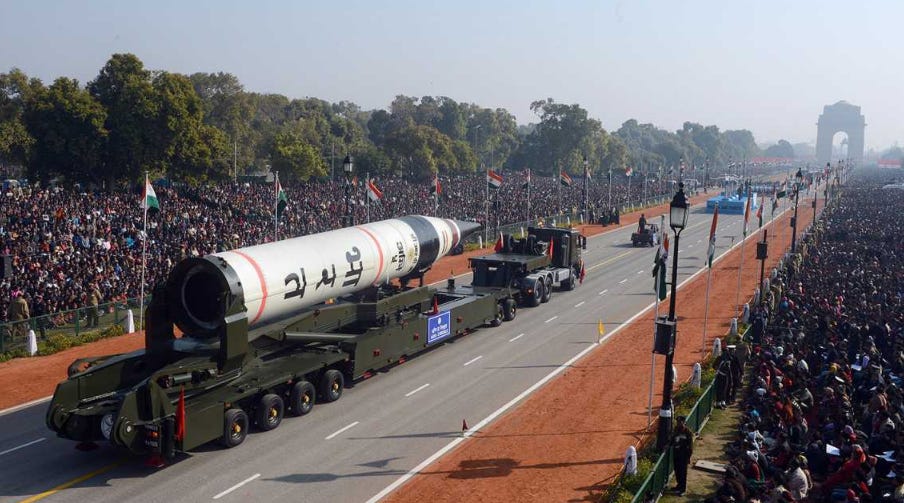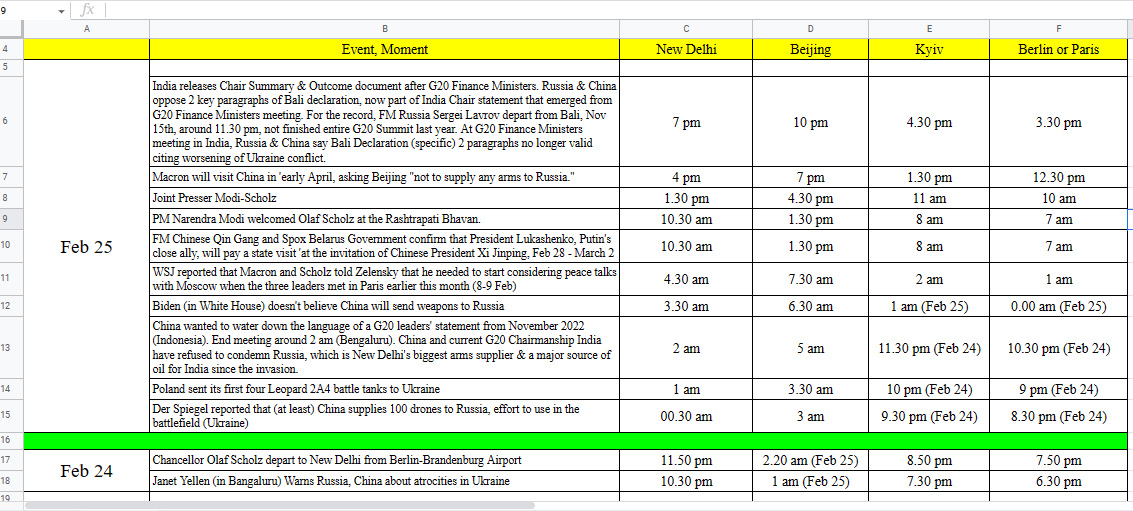India’s natural / traditional enemy, till today, is China & also Pakistan. 400k (accumulation) soldiers China and India at the borders. Both countries (and also Pakistan) have a nuclear weapon.
5 Months ago, India Airforce buy Rafale (France) jet fighter same quantity with Indonesia. Until today, India still “QUAD” members, among US, Australia, Japan. Then, India decide “ease” Russia suffer amid war Russia - Ukraine with Rouble - Rupee scheme mechanism. India really acknowledge Russia is “staunchest ally” for China. FM China Wang Yi was told “solid rock”. Just make sure everyone know that G20 Presidency next year is India.
And just remember one (another thing) after EU Ursula von der Leyen visit India 4 days ago: another high ranking leader was “Indian root”, named VP of the U.S. Kamala Harris.
Russia-Ukraine war poses a fundamental challenge to India’s traditional strategy of non-alignment. India currently mitigate, finds itself between a rock and a hard place, potentially antagonizing the West while still losing Russia to China's embrace.
India abstained in a succession of United Nations votes – in the Security Council, the General Assembly, and the Human Rights Council – condemning the Russian invasion. On March 2, the United Nations General Assembly voted, 141 to 5, on a resolution condemning Russia for invading Ukraine. India, the world’s largest democracy, abstained from the vote.
It wasn’t India’s first abstention. In its initial “explanation of vote,” India did not even mention Russia or deplore the invasion. Instead, India merely urged a de-escalation of the conflict by those involved, as if both countries were belligerents, when in fact there is an obvious aggressor and a clear victim. India did not even object to Russia’s earlier recognition of the independence of the separatist Ukrainian regions of Donetsk and Luhansk, and with an atrocities like in Bucha and Mariupol.
In subsequent statements, Prime Minister Narendra Modi’s government has at least reiterated India’s longstanding principles, while calling for “concerted efforts from all sides to return to the path of diplomatic negotiations and dialogue.” In the face of mounting casualties – including an Indian student killed by Russian fire while queuing for food in Kharkiv – Modi’s government continues to call in vain for peace, while ensuring that no criticism, let alone condemnation, of Russia passes official lips.
India has not joined the widespread condemnation of Russia's invasion and is a major buyer of Russian arms. But it faces a diplomatic balancing act, and is under pressure from Western countries to help rein in Russia.
Following the talks India said it favoured peaceful resolutions of conflicts but did not criticise Russia. India, which is a nuclear power, has a long history of pursuing a non-aligned strategy in international politics, not tying itself to the interests of other superpowers or political blocs.
The reasons for India’s reticence are easy to discern. For starters, Russia supplies India with about 50% of its weapons and defense equipment. And while India’s other commercial ties with Russia are much more modest than those it has with the United States, diplomatic relations with the Kremlin have been close since the days of the Soviet Union. Soviet vetoes at the UN frequently shielded India on Kashmir, and the Kremlin’s protection was indispensable during the 1971 Bangladesh War of Independence, when the US and China supported Pakistan.
Indian policymakers should avoid succumbing to the illusion of size, and reconcile themselves with their country's current status as a middling power. Stalemate currently Day-64 war amid Moskva-Kyiv, forcing India to reassess its security and economic strategies. The government’s decisions will be shaped by its assessment of the country’s military and economic strengths, but it should resist the temptation to equate them with India’s size.
Russia’s increasing closeness to, and geopolitical affinity with, China has therefore been worrying Indian policymakers for some time. The Kremlin has also been visibly warming to Pakistan, China’s client state. Pakistani Prime Minister Imran Khan was in Moscow even in Day-2 war, then has been removed from office (April 3rd, 2022). Russia’s calculations in the subcontinent have shifted. India seems to feel that it needs to cling to Russia’s goodwill in order to avoid losing it altogether.
India’s friendship with the then-Soviet Union became official in 1971, after the two countries signed a Treaty of Peace, Friendship and Cooperation. That year, the Soviets backed India in a war that ultimately led to the independence of Bangladesh. Around this time, the US was also pursuing its opening to China (with Pakistan, India’s foe, as the go-between), and both the USSR and India saw a common interest in balancing against China.
This friendship pact with Russia was about as close to an alliance as India was comfortable enough to get at the time, experts said. During the Cold War, India practiced a foreign policy of non-alignment, an approach embraced by many newly independent states following decolonization after World War II.
The Soviet Union and the US were battling for spheres of influence in these countries, so non-aligned countries sought to stay out of the superpower conflict and assert their right to independently run their foreign and domestic policy, with varying degrees of success. India saw itself as a leader in this movement, but that also didn’t preclude it from swaying toward Moscow when it made sense for India’s own interests.
The Soviet Union and India saw a benefit in relying on each other to counter China and a possible US-China partnership. From the 1970s onward, India built up its military with Soviet, and later Russian, arms and equipment. Even today, the majority of India’s weaponry is of Soviet or Russian origin. Since 2010, Russia makes up two-thirds of India’s arms imports. New Delhi remains Moscow’s biggest arms importer.
All this is happening at a time when the security threat from Afghanistan is at its greatest since the Taliban was last in power two decades ago. China’s buildup of military infrastructure in the region, its financial patronage of the Taliban, its opening to Iran (which cooperated with India in countering the previous Taliban regime), and an increase in Pakistani-supported militancy in Kashmir have put India on the defensive. Russia, China, and Iran recently conducted joint naval exercises in the Indian Ocean.
India’s traditional allies in the region can sense which way the wind is blowing. Nepal has allowed China to build major railway lines and highways across its northern border areas. Bhutan signed a border agreement last October that surrenders territory coveted by China, giving the Chinese an advantage in any future conflict with India. Most of India’s other South Asian neighbors have signed up to China’s Belt and Road Initiative, which India strenuously opposes.
China’s increasing influence over these countries undermines India’s diplomatic position in its own backyard. And to the east, the ruling junta in Myanmar has declared a “special kinship” with China, whereas its predecessor had come to see India as a valuable counterbalance to China.
In short, Russia’s invasion of Ukraine has placed India in an unenviable position. Ideally, India would have liked to continue strengthening its partnerships with Western democracies, especially Australia, France, Japan, the United Kingdom, and the US, while maintaining its traditional closeness to Russia, in the hope of deterring China from further encroachment on India’s core security interests. Instead, India finds itself between a rock and a hard place. It could antagonize the West while still losing Russia to China’s embrace, even as Pakistan – with friendlier Afghan and Iranian neighbors – feels emboldened in Kashmir.
A more assertive Indian doctrine and the growing nuclear and missile capabilities in New Delhi could prompt Beijing to consider changes in its practices, particularly if the United States is seen as strengthening India as a regional counterbalance to China. Jeopardize to sweetened relation with Moskva maybe will facing result, or consequences, not so far from now.






